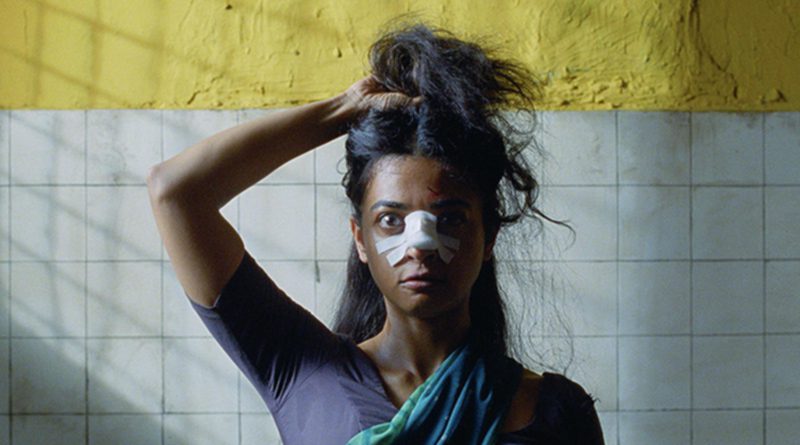Sister Midnight Review: Karan Kandhari’s Erratic but Fascinating Debut Feature Navigates the Absurdist Path of an Arranged Marriage
There’s something idiosyncratic about Karan Kandhari’s debut feature Sister Midnight right from the onset: Howlin’ Wolf’s 1951 blues song “Moanin’ at Midnight” uncharacteristically played in the background, while the nighttime scene depicts a moving train before the camera slowly turns its attention to a young Indian couple sitting at one of the compartments in silence.
The couple in question is Uma (Radhika Apte) and Gopal (Ashok Pathak), where the latter is seen sleeping in a slouching position. They are both newly wed. An arranged marriage, to be exact, and Kandhari’s unusual song choice for such a scene echoes Uma’s sense of void and disbelief. They barely talk to each other, even when they reach home at Gopal’s rundown, one-room shack located in the noisy slums of Mumbai.
The shack looks as hopelessly plain as Uma’s mundane married life. It’s clear that this is not what she wants, but Kandhari resists going for the conventional storytelling method, opting instead for the predominantly dialogue-free, vignette-style moments of Uma going through the day and night, looking bored at home. Her husband isn’t particularly good with communication, other than going to work during the day and coming back home drunk at night.
Uma isn’t any better either, but at least she tries to make an effort. As a wife, she looks clueless when it comes to handling the household chores. For instance, she has a tough time using a kitchen knife that she borrows from her next-door neighbour to chop up some fresh ingredients. But she gradually learns from her neighbour about how to cook rice and prepare spicy dishes.
Intimacy between husband and wife is sadly out of the question, even when Uma attempts to make a move, only to be misunderstood by Gopal in a brief but humorously deadpan scene. A continuous sense of awkwardness doesn’t stop there, as at one point, a so-called plan of a weekend getaway ends up wasted for ridiculous long hours of travelling by bus for nothing.
Then, one night after the two attend Gopal’s cousin’s wedding, something doesn’t feel right. It all begins with Uma throwing up, claiming it must be food poisoning she got from eating at the wedding. She becomes increasingly erratic before she finally had enough. Remaining homebound all the while is going to drive her insane. So, she took the initiative to travel far to the city to look for a job and ended up securing one as a cleaner.
Sister Midnight is pretty much a deliberate slow-burn, while Kandhari’s insistence on doubling down on how prosaic Uma’s life is even after she finds a job might be a turn-off, particularly for impatient viewers with short attention spans. As the movie progresses, we see a gradual metamorphosis of Uma’s physical and mental condition around the halfway mark. Let’s just say it gets bizarre that has to do with goats, birds and occasional fainting at odd moments.
The second half is where Kandhari begins to get increasingly experimental beyond the absurdist comedy route related to an arranged marriage. The result may have been bold and interesting to see Kandhari willing to push the limit in taking creative risks. But at the same time, not everything works in the second half, with some of Kandhari’s ideas and metaphorical contexts missing the mark.
This leads to an inconsistency in the movie, even though there are still worthy moments that deserve mention, like an extended scene of Uma and Gopal trying to spend their free time together on Sunday. Not to mention a scene where they finally decide to get intimate and what happens next, well, you have to see for yourself.
The overall peculiar nature of Sister Midnight mostly works, thanks to Radhika Apte’s committed performance. The dialogue may have been sparse, but Apte’s expressive acting speaks a thousand words. It is also hard not to sympathise with her character being bored and frustrated as she is forced to go through a loveless arranged marriage.





